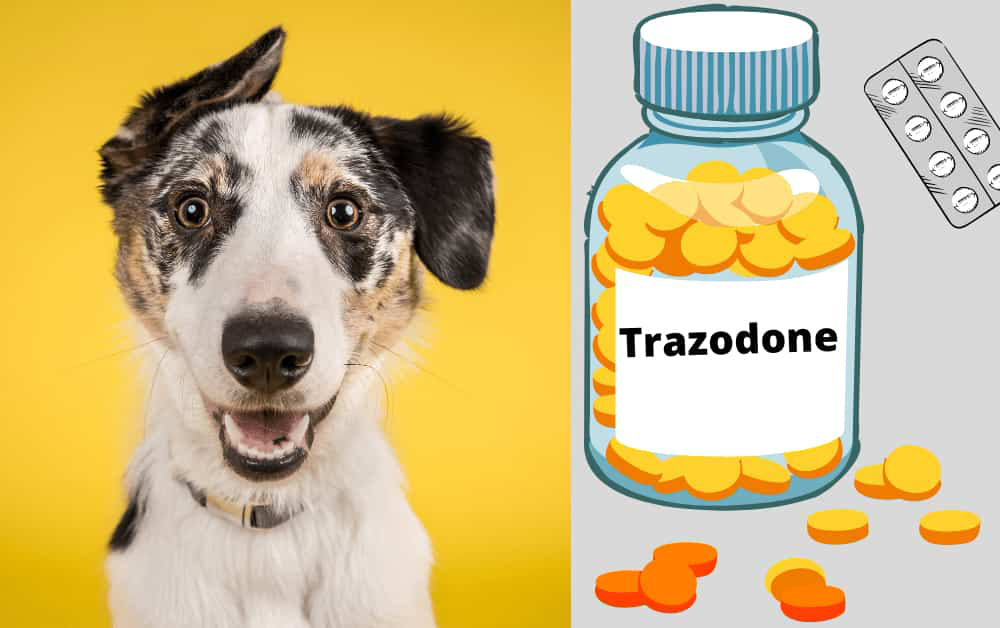Trazodone for Anxiety in Dogs: A Safe Solution for Calmness

Have you ever seen your dog cower during a thunderstorm or whimper when you’re about to leave the house?
If you’re nodding along, you know that anxiety in dogs is as real and concerning as it is in humans. It manifests in various ways, from non-stop barking and chewing furniture when alone to shivering at the slightest loud noise.
Understanding and managing your dog’s anxiety is crucial to ensuring they live a happy, stress-free life. One possible solution to help soothe your dog’s nerves is Trazodone for anxiety in dogs which is commonly prescribed.
Key Takeaways
- Recognize signs of canine anxiety, including pacing, whining, and behavioral changes.
- Trazodone, introduced in the 1960s, stabilizes mood and reduces anxiety by increasing serotonin levels in dogs.
- Administer Trazodone as prescribed, monitor for side effects, and promptly report concerns to your vet.
- Holistically manage anxiety by combining Trazodone with behavior modification techniques for optimal results in dogs.
Have you ever seen your dog cower during a thunderstorm or whimper when you’re about to leave the house?
If you’re nodding along, you know that anxiety in dogs is as real and concerning as it is in humans. It manifests in various ways, from non-stop barking and chewing furniture when alone to shivering at the slightest loud noise.
Understanding and managing your dog’s anxiety is crucial to ensuring they live a happy, stress-free life. One possible solution to help soothe your dog’s nerves is Trazodone which is commonly prescribed.

What Is Trazodone?
Trazodone is a medication that’s been commonly prescribed in human medication since the 1960s to treat conditions like depression and generalized anxiety. According to AVMA Publications, it was first synthesized in Itlay in 1966 as an anti-anxiety drug.
It comes under the classification of serotonergic drugs. Over the past few years, it has gained prominence in veterinary medicine to treat behavioral disorders. But what exactly does it do?
The Science of Trazodone and Dog Anxiety
According to Kingdales, Trazodone is an anti-anxiety medication, that helps increase serotonin levels—a feel-good hormone in the brain that stabilizes mood. It is a serotonin antagonist reuptake inhibitor (SARI).
Think of it as a mood smoother for your dog, helping to flatten out the emotional spikes that lead to anxiety. By calming the storm in their brains, it allows them to cope more easily with stress-inducing situations.
The sedative effects byproduct of the drug’s action on serotonin pathways as well as its ability to block certain other receptors in the brain, can lead to drowsiness and a calming effect.

Recognizing Anxiety in Dogs
According to Tufts, Cummings School of Veterinary Medicine, before prescribing trazodone for dogs, it’s essential to recognize the clinical signs of anxiety in dogs. They can’t tell us they’re stressed, but they show it in many ways:
- Pacing or shaking.
- Whining or barking.
- Yawning, drooling, or licking.
- Hiding or escaping.
- Changes in eyes and ears (e.g., ears back, pupils dilated).
- Changes in posture (crouching, tail tucked).
- Shedding excessively.
- Pants heavily or refuses to eat.
Understanding these signs is the first step in addressing your dog’s anxiety disorders.
Is Trazodone Right for Your Dog?
Trazodone for dogs has been suggested by many veterinarians as an anti-anxiety medication. Not every anxious dog will need medication. Sometimes, changes in the environment, behavior modification techniques, or natural remedies can suffice.
According to PetMD, Trazodone for dogs with severe anxiety or in high-stress situations, medication may be the best option. Several other anti-anxiety medications are also available.
When Do Vets Prescribe Trazodone?
According to the Merck Veterinary Manual, dog anxiety has several causes. Veterinarians might suggest Trazodone for dogs in the following situations:
- Fear of Loud Noises: Noise phobia, Fireworks, thunderstorms, and stressful events can terrify dogs. Trazodone can help them stay calm.
- Separation Anxiety: Separation anxiety happens when the owner leaves the dog alone at home. Some dogs can’t handle situational anxiety and may become destructive. Trazodone can ease separation anxiety.
- Pre- and Post-Surgery: To keep dogs quiet and prevent them from injuring themselves after surgery or during veterinary visits, vets may prescribe Trazodone.
- Travel Anxiety: If your dog gets car sick or nervous when traveling, Trazodone can help them relax.
- Adjustment Periods: Moving to a new home or introducing new family members (pets or humans) can be stressful events. Trazodone can help dogs adjust to changes.

Safety and Side Effects
According to veterinary medicine, prescribing dog trazodone is generally considered safe and calm dogs, but like all medications, it comes with potential side effects. It’s crucial to discuss these with your vet and to monitor your dog’s response to the medication closely.
Possible Adverse Effects
Possible adverse reaction and negative reactions include:
- Drowsiness: The most common side effect, which can be beneficial if relaxation is the goal.
- Gastrointestinal issues: Such as vomiting or diarrhea.
- Increased anxiety or agitation: Paradoxical effects like this are rare but possible.
- Cardiac arrhythmias: Though uncommon, they can occur, especially in dogs with pre-existing heart conditions.
- Serotonin syndrome: Serotonin syndrome poses a potential threat to life and emerges when there is an overabundance of serotonin within the body.
Always report side effects to your vet, as they may need to adjust the dosage or try a different treatment.

Trazodone dosage for dogs
The dosage range depends on several factors. If your vet prescribes a Trazodone dosage for dogs, you’ll receive specific instructions on how to administer it. Here are a few general tips:
- Always follow the prescription details for the trazodone dose.
- Trazodone can be given empty stomach or with food, but avoid giving it empty stomach to minimize the risk of stomach upset.
- Be consistent with the timing of doses and never combine it with other medicines to avoid drug interactions without veterinarian approval.
- Never abruptly stop the medication; it should be tapered off under veterinary guidance to avoid withdrawal symptoms.
Trazodone overdose
Symptoms of very high doses in dogs can vary but may include:
- Severe lethargy or sedation: The dog may appear unusually sleepy or unable to wake.
- Vomiting: An early sign of many overdoses, including that of Trazodone, is vomiting.
- Behavioral disorders: Some dogs may experience behavioral disorders due to overdose.
- Tremors or seizures: These more severe symptoms suggest a significant overdose.
- Rapid heart rate: An elevated heart rate is a common response to overdose.
- Respiratory distress: Difficulty breathing may occur in severe cases.
- Hypertension or hypotension: Blood pressure may spike or drop, which can be dangerous.

Realistic Expectations
It’s important to have realistic expectations when using Trazodone. It’s not a cure for anxiety but a way to manage symptoms. The goal is to provide relief during particularly stressful periods or as part of a long-term management plan for chronic anxiety.
Combining Trazodone With Behavior Modification
The most effective long-term treatment for anxiety in dogs is a combination of medication and behavior modification. Working with a professional trainer or behaviorist can make a significant difference.
Techniques such as positive reinforcement, desensitization, and counter-conditioning can help address the root causes of anxiety.
The Big Picture
Managing your dog’s anxiety with Trazodone is a multifaceted approach. It’s about understanding your dog, recognizing the signs of stress, working closely with your vet, and using the medication responsibly. It’s also about patience and love—remember, anxiety can be as tough on your dog as it is on you.
Final Thoughts
Anxiety doesn’t have to control your dog’s life, nor does it have to be a constant source of stress for you. With the right strategies, including the use of Trazodone when appropriate, you can help your dog live a more relaxed and happy life.
Conclusion
As we conclude this conversation, remember that the journey to managing dog anxiety is a marathon, not a sprint. Trazodone is used to treat behavioral issues in dogs, including anxiety, phobias, and stress.
It functions by elevating serotonin levels in the brain, promoting mood stability, and alleviating anxiety. Trazodone, an antidepressant prescribed for humans, is also utilized in dogs under veterinary guidance; however, improper usage poses a risk of overdose.
With the right support, including the careful use of Trazodone, your anxious pup can become the calm, confident dog they were meant to be. So, take heart! With a bit of knowledge, care, and effort, you can make thunderstorms and goodbyes much less scary for your furry friend.
Frequently asked questions
Q: What is Trazodone, and why is it prescribed to dogs? A: Trazodone is a medication originally designed to treat human depression but is commonly prescribed by veterinarians to treat anxiety-related conditions in dogs. It helps to stabilize mood and reduce anxiety by increasing serotonin levels in the brain.
Q: How do I know if Trazodone is right for my dog? A: A veterinarian will determine if Trazodone is appropriate for your dog based on their health history, symptoms, and specific anxiety triggers. Always consult with your vet before starting any new medication for your pet.
Q: What dosage of Trazodone should I give my dog? A: The dosage of Trazodone for dogs varies based on the dog weight, age, health condition, and the severity of the symptoms. Your veterinarian will provide a dosage recommendation tailored to your dog’s needs.
Q: Can Trazodone be used with other medications my dog is taking? A: Trazodone can interact with other medications, so it’s important to discuss all current medications your dog is on with the vet. The vet will decide if Trazodone can be safely combined with other treatments.
Q: What are the potential side effects of Trazodone in dogs? A: Side effects can include sedation, ataxia, gastrointestinal upset, changes in appetite, anxiety, cardiac effects, respiratory depression, and seizures. Always monitor your dog for side effects and report them to your vet.
Q: How quickly does Trazodone take effect in dogs, and how long does it last? A: Trazodone generally begins to take effect within an hour of administration, and the effects can last anywhere from 4 to 8 hours. The duration may vary based on the individual dog and the dosage.
Q: Can Trazodone be given to a dog on an ongoing basis? A: Some dogs may be prescribed Trazodone for long-term use under veterinary supervision, while others may only use it during specific anxiety-inducing situations. Your vet will advise you on the best course of action for your dog.
Q: What should I do if I miss giving my dog a dose of Trazodone? A: If you miss a dose, give it as soon as you remember unless it’s almost time for the next dose. In that case, skip the missed dose and resume the regular dosing schedule. Do not double up on doses.
Q: Can a dog overdose on Trazodone? What are the signs? A: Yes, a dog can overdose on Trazodone, and signs of overdose include extreme sedation, vomiting, agitation, tremors or seizures, rapid heart rate, and breathing difficulties. If you suspect an overdose, seek veterinary care immediately.
Q: Is Trazodone addictive for dogs? A: Trazodone is not known to be addictive in dogs, but it should always be used according to a veterinarian’s directions, and the dog should be weaned off the drug under veterinary supervision if it’s been used long-term.
Q: How should I store Trazodone for my dog? A: Store Trazodone at room temperature, ideally between 68°F and 77°F (20°C to 25°C). Keep it in a secure location away from heat, moisture, and direct light to preserve its effectiveness. Don’t mix it with other drugs.
This comprehensive guide should serve as a friendly, informative conversation starter for dog owners exploring using Trazodone to manage their pets’ anxiety. lead a calm, happy life.
